Animal Radio® Show #425 January 26, 2008
Where Do Our Candidates Stand on Animal
Issues?
Michael Markarian, President
of the Humane Society Legislative Fund
Michael Markarian is the president of the Humane Society Legislative
Fund, a 501(c)(4) social welfare organization that lobbies for
animal welfare legislation and works to elect humane-minded candidates
to public office. In almost 15 years in the animal protection
movement, Markarian has worked for the passage of countless state
laws and federal statutes to protect animals, in addition to helping
defeat some of the strongest anti-animal welfare politicians in
the United States.
Michael returns once again to Animal Radio®
to discuss where our front-running candidates stand on animal
welfare issues.
Evaluating the Elephants:
 I
want to provide an overview of the Republican presidential candidates.
Mike Huckabee has a terrible approach to animal cruelty issues
and panders to the sport-hunting lobby and Ron Paul's has a philosophical
opposition to even the most modest animal welfare policies in
Congress. Here's what we know about the other presidential hopefuls
in the party of the elephants:
I
want to provide an overview of the Republican presidential candidates.
Mike Huckabee has a terrible approach to animal cruelty issues
and panders to the sport-hunting lobby and Ron Paul's has a philosophical
opposition to even the most modest animal welfare policies in
Congress. Here's what we know about the other presidential hopefuls
in the party of the elephants:
Rudy Giuliani:
As mayor, Giuliani did not have as many opportunities to take
a position on animal issues as those who served as governor or
a member of Congress, but he did take some proactive measures
in America's largest city. In 2000, he proposed and signed a bill
to promote the spaying and neutering of dogs and cats and open
an animal shelter in each borough in order to help curb New York's
pet overpopulation. He is the first Republican candidate to release
a public statement on animal issues, which is reproduced here
in its entirety: "Animals play an important part in the lives
of many Americans. We should all work to reduce animal suffering
by advocating for sensible public policies, investigating animal
cruelty and strongly enforcing the laws that are already on the
books. I will continue to support efforts to educate the public
about animal issues, and work with corporations to develop animal-friendly
policies."
John McCain:
In the U.S. Senate, McCain has been a strong supporter of numerous
animal welfare issues, earning scores of up to 75 percent on the
Humane Scorecard. He has voted for and co-sponsored legislation
to stop horse slaughter, and voted to eliminate a $2 million subsidy
for the mink industry. He has co-sponsored bills to stop the interstate
shipment of birds for cockfighting and to stop the poaching of
bears by ending the trade in their gall bladders and other viscera.
He took an anti-animal position by supporting an amendment to
the California Desert Protection Act, which would have allowed
sport hunting in the Mojave National Park. Senator McCain has
been a leader in the effort to stop global warming, and he opposes
drilling for oil in the Arctic National Wildlife Refuge, which
is home to many wildlife species.
Mitt Romney:
Romney attracted the ire of animal advocates when they learned
that during a 1983 vacation, he put the family's Irish setter,
Seamus, in a carrier and strapped him to the roof rack of the
station wagon. When the terrified dog urinated and defecated during
the twelve-hour drive, Romney pulled over, hosed down the dog,
and continued the voyage from Boston to Ontario. As chief executive
of the 2002 Winter Olympics in Salt Lake City, Romney also came
under fire from animal protection groups for allowing a rodeo
exhibition that included calf roping. His term as governor didn't
exactly inspire confidence in his judgment on animal issues, either.
He appointed a raft of animal-unfriendly people to the state Fisheries
and Wildlife Board. He did, however, leave the governor's mansion
on a high note by signing a bill passed in 2006 to strengthen
the Massachusetts animal fighting law and prevent a convicted
animal abuser from getting the animal back.
Mike Huckabee:
Huckabee has been in the news recently for his son's alleged history
of animal cruelty. Huckabee was the state's chief executive for
more than a decade, and was largely viewed by animal advocates
as an impediment to moderate reforms, or at the very least, someone
who never lifted a finger to advance animal welfare. The governor's
record on animal issues was further tarnished in 1998 when the
Arkansas Democrat-Gazette reported that Huckabee's 17-year-old
son, David, was fired from his job as a Boy Scout camp counselor
because he and another teen allegedly killed a stray dog. Animal
protection groups reported that the boys hanged the dog, slit
his throat, and stoned him to death-but the teens were never charged
with any crime. Huckabee reportedly stood in the way of the investigation.
Discussing the Donkeys:
 I've
been introducing you to the candidates from both sides of the
political spectrum. I provided a round-up of where the Republican
presidential candidates stand on animal issues, and now it's time
to summarize the Democrats. It's a tougher task, because there
are not as many clear distinctions. All of the Democratic contenders
have been friends of animal welfare, and have received high marks
year after year on the Humane Scorecard. I've attempted to highlight
some of the things that stand out.
I've
been introducing you to the candidates from both sides of the
political spectrum. I provided a round-up of where the Republican
presidential candidates stand on animal issues, and now it's time
to summarize the Democrats. It's a tougher task, because there
are not as many clear distinctions. All of the Democratic contenders
have been friends of animal welfare, and have received high marks
year after year on the Humane Scorecard. I've attempted to highlight
some of the things that stand out.
Hillary Rodham Clinton: In the current session of Congress, Sen. Clinton
is a co-sponsor of legislation dealing with horse slaughter and
animal fighting, and she previously co-sponsored legislation to
stop the processing of "downer" livestock and to crack
down on abusive puppy mills where dogs are treated like production
machines. She led efforts in the 108th and 109th Congresses to
stop the overuse of antibiotics in farm animals, which allow them
to be crammed in overcrowded, stressful, unsanitary conditions
on factory farms. She had a perfect 100 percent score on the Humane
Scorecard in the 108th and 109th Congresses.
John Edwards:
A leader on the issue of factory farming, Sen. Edwards has called
for a moratorium on the construction or expansion of concentrated
animal feeding operations (CAFOs). His campaign has released a
positive statement on animal welfare, and you can read more about
his record in my longer entry, "John Edwards on Animals and
Rural America."
Dennis Kucinich:
An ethical vegetarian, Rep. Kucinich has been one of the true
leaders on animal protection issues in the U.S. House of Representatives.
He is currently a co-sponsor of 14 animal protection measures
in the 110th Congress, one of the highest numbers among all 435
members. He led the effort in 2001 and 2002 to secure more funding
for the U.S. Department of Agriculture's enforcement of the Animal
Welfare Act at puppy mills, research laboratories, zoos, circuses,
and other facilities. When animal issues are considered on the
House floor, Rep. Kucinich can often be found speaking in favor
of the animal protection position. In November, he hosted an online
forum to discuss animal issues.
Barack Obama:
In the current session of Congress, Sen. Obama is a co-sponsor
of measures to stop horse slaughter, upgrade the penalties for
animal fighting, and crack down on dogfighting. He has had a strong
record for animals in both the Illinois State Senate and the U.S.
Senate. Read more about his responses to the Humane Society Legislative
Fund's questionnaire in my longer entry, "Barack Obama and
the Dog-acity of Hope."
To sum it up, the Democrats have received
higher marks on the Humane Scorecard with regard to animal protection,
with Mike Huckabee having the lowest score and Hillary Clinton
scoring 100%.
Animal protection advocates should take
advantage of this opportunity and query the candidates on their
stands on animal issues. You should call their campaign offices
in the states and ask where they stand if they have not already
staked out positions. Let them know that the humane treatment
of animals is an important policy issue. You can inject animal
protection into the presidential debate, and let the candidates
and the media know it's important to voters of all political stripes.
This increasing level of support makes
it clearer than ever that animal protection is being taken seriously
as a public policy issue. We built our record and grew our ranks
in a major way in 2007. Now, it's time to push these reforms for
animals over the finish line in 2008. Contact your federal lawmakers
and thank them for supporting animal protection bills-and urge
them to forge ahead for animals in the New Year.
To read more on how the candidates scored
on the Humane Presidential Questionnaire, visit http://www.animalsandpolitics.org.
http://www.fund.org/voter_guide/2008_pres_candidates.html
http://www.fund.org/humanescorecard
Presidential Race or Dogfight?
Vladae, The Russian Dog Wizard
If your candidate were a dog, what type of dog would they be?
Vladae, who knows dogs better than anyone, gives us that answer.
Republicans:
 Mitt
Romney Mitt would be a Great Dane, which is tall, calm,
stable, full of dignity and handsome. However the Great Dane also
can be very aggressive with other males and chases small animals
(in other words lower ranking human people). He would be an authoritarian
leader, so to balance him; he would need another (Democrat) dog
like a Labrador Retriever or a Golden Retriever.
Mitt
Romney Mitt would be a Great Dane, which is tall, calm,
stable, full of dignity and handsome. However the Great Dane also
can be very aggressive with other males and chases small animals
(in other words lower ranking human people). He would be an authoritarian
leader, so to balance him; he would need another (Democrat) dog
like a Labrador Retriever or a Golden Retriever.
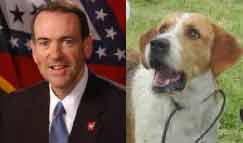 Mike
Huckabee Mike would be a
Foxhound because a Foxhound likes everyone, they think everyone
is a good guy and they want to be buddies with everyone. But,
as with all hounds, they only focus on one task at a time. To
become a good president, he would need some muscle, like that
of a German Shepherd to act as vice president.
Mike
Huckabee Mike would be a
Foxhound because a Foxhound likes everyone, they think everyone
is a good guy and they want to be buddies with everyone. But,
as with all hounds, they only focus on one task at a time. To
become a good president, he would need some muscle, like that
of a German Shepherd to act as vice president.
 John
McCain John would be a German Shepherd which is loyal
and smart. On the down side, the German Shepherd also can be nasty
if not properly socialized and very aggressive. He needs to also
have some type of a more diplomatic dog like a Poodle to go along
with him.
John
McCain John would be a German Shepherd which is loyal
and smart. On the down side, the German Shepherd also can be nasty
if not properly socialized and very aggressive. He needs to also
have some type of a more diplomatic dog like a Poodle to go along
with him.
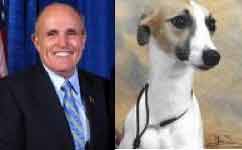 Rudy
Giuliani Before the race,
Rudy was a Neapolitan Mastiff but now he is an Italian Greyhound,
which is manipulative but faithful, but also lacks loyalty. They
also have an attitude of a big dog. If they see something attractive,
they will break away and chase it with the speed of a Russian
Satellite Guided Missile.
Rudy
Giuliani Before the race,
Rudy was a Neapolitan Mastiff but now he is an Italian Greyhound,
which is manipulative but faithful, but also lacks loyalty. They
also have an attitude of a big dog. If they see something attractive,
they will break away and chase it with the speed of a Russian
Satellite Guided Missile.
Democrats:
 John
Edwards John would be a
Standard Poodle, which is smart and playful. On the down side,
the Standard Poodle is too noisy and too hyper and needs some
muscle from a dog like a Boxer, a Pit Bull or a Great Dane for
balance.
John
Edwards John would be a
Standard Poodle, which is smart and playful. On the down side,
the Standard Poodle is too noisy and too hyper and needs some
muscle from a dog like a Boxer, a Pit Bull or a Great Dane for
balance.
 Dennis
Kucinich Dennis would be a Chihuahua, which is loyal
and has an attitude of a big dog. But, since he has no strength,
he would need to get it from another dog, like an Irish Wolfhound.
Dennis
Kucinich Dennis would be a Chihuahua, which is loyal
and has an attitude of a big dog. But, since he has no strength,
he would need to get it from another dog, like an Irish Wolfhound.
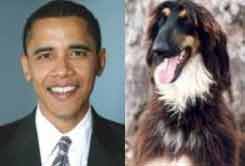 Barack
Obama Barack would be an
Afghan Hound Puppy, because like a puppy, he is full of hope and
believes that every puppy should have a meaty bone and not just
scraps. The Afghan Hound is also a rare breed, so he needs another
dog, which is more familiar and acceptable, to win.
Barack
Obama Barack would be an
Afghan Hound Puppy, because like a puppy, he is full of hope and
believes that every puppy should have a meaty bone and not just
scraps. The Afghan Hound is also a rare breed, so he needs another
dog, which is more familiar and acceptable, to win.
 Hillary
Clinton Hillary would be a mutt, perhaps a cross between
a Cocker Spaniel and a Pit Bull, sort of like a wolf in sheep's
clothing. Cocker Spaniels are cocky and snappy. Pit Bulls are
attack dogs. She doesn't care what her gender is nor if she is
in the minority. She is not submissive and is very dominant, and
will show every other dog where their fence line is, because she
knows if she doesn't, they will show it to her.
Hillary
Clinton Hillary would be a mutt, perhaps a cross between
a Cocker Spaniel and a Pit Bull, sort of like a wolf in sheep's
clothing. Cocker Spaniels are cocky and snappy. Pit Bulls are
attack dogs. She doesn't care what her gender is nor if she is
in the minority. She is not submissive and is very dominant, and
will show every other dog where their fence line is, because she
knows if she doesn't, they will show it to her.
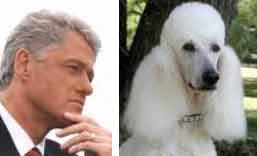 And,
just for fun:
And,
just for fun:
Bill Clinton
Bill would be a Poodle, smart but also manipulative like
a Pit Bull, but together with Hillary, they are a great combination.
Hillary was always a Pit Bull and Bill was always a poodle.
Vladae believes that when it comes down
to the end, it will be the Great Dane (Mitt Romney) and the Pit
Bull (Hillary Clinton). He also believes the final "dog fight"
winner will be the Pit Bull (Hillary) because no one can win in
a fight against a Pit Bull!
http://www.controlyourpet.com
NEWS UPDATE: Car Wash Adds Pet Wash
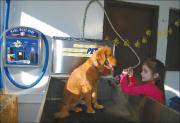 This
time of year, dogs can get really dirty. It's too cold to wash
them outside, so you put them in your tub and deal with the mess.
This
time of year, dogs can get really dirty. It's too cold to wash
them outside, so you put them in your tub and deal with the mess.
Well, Michael Seale of the Adirondack
Pet Wash has solved this problem. He already had a car wash, so
he thought why not add a pet wash!
People are lining up to not only wash
their cars, but also wash their dogs. There is nothing else like
it in the community, and the pet wash provides everything you
need from shampoo, flea and tick products, and deodorizers. You
don't have to go out to buy any products, nor bring your products
from home.
For $5 you get eight minutes to use a
system that comes equipped with all the products - even including
blow dryers. But don't worry if you run out of time, you can add
money before the timer runs out. And if you run out of cash, they
also take credit cards.
 NEWS
UPDATE Brought To You By Simple Solution Natural Line Of Products
NEWS
UPDATE Brought To You By Simple Solution Natural Line Of Products
Genius Dog
Barbara Smuts, Prof. of Psychology,
Univ. MI
 Barbara Smuts, a Professor of Psychology
at the University of Michigan who studies canine social behavior,
thought this dog owner must be a crackpot. The woman from Maryland
kept insisting her dog was going into the backyard and arranging
his many plush toys into geometric shapes of circles, parallel
lines and triangles. Come on, you must be helping him, responded
Smuts. And if you're not, the neighbors must be playing a trick
on you, she said. The woman steadfastly ruled out Smuts's reservations,
and the professor eventually flew to Maryland to visit the woman
and her dog, Donnie.
Barbara Smuts, a Professor of Psychology
at the University of Michigan who studies canine social behavior,
thought this dog owner must be a crackpot. The woman from Maryland
kept insisting her dog was going into the backyard and arranging
his many plush toys into geometric shapes of circles, parallel
lines and triangles. Come on, you must be helping him, responded
Smuts. And if you're not, the neighbors must be playing a trick
on you, she said. The woman steadfastly ruled out Smuts's reservations,
and the professor eventually flew to Maryland to visit the woman
and her dog, Donnie.
Smuts now believes Donnie is, in fact,
creating the displays. Donnie, a male Doberman, was at first reluctant
to perform for Smuts, probably because he was more excited about
having a new person in the house. So she suggested the woman install
a few security cameras, which recorded Donnie in the act, moving
his more than 80 plush toys into geometric shapes and creating
social vignettes with them. "She actually got some significant
footage of him,'' Smuts said. "Not as much as I would like,
but enough to show that he's doing it, and it's not something
he has been trained to do, and it's completely spontaneous.''
Cable TV viewers will be able to make
up their minds themselves when the National Geographic Channel
will once again air "Genius Dogs" at 1 p.m. Dec. 30,
7 p.m. Feb. 1 and 2 a.m. Feb. 2.
"Donnie can't be the only dog in
the world who does this,'' Smuts said. "I'm hoping that people
will see this show and say, 'Hey, that's like my dog, or I know
a dog that does that,' and e-mail me. We need a larger sample
to find out what's going on.'' Smuts has a Web site at www.sitemaker.umich.edu/barbara.smuts/home.
You can also e-mail her at bsmuts@umich.edu.
Can Dogs Talk?
Kay Cox, Animal Behaviorist
 Surprisingly, yes. "As people
become more conversational with their dogs, it happens,"
says Arizona-based animal behaviorist Kay Cox. "Dogs want
so desperately to communicate with their owners that they try
to speak in our language instead of their own when they need something."
Dogs also feel we are not intelligent enough to speak their language,
so they attempt to speak ours, even though ours is a much harder
language to learn.
Surprisingly, yes. "As people
become more conversational with their dogs, it happens,"
says Arizona-based animal behaviorist Kay Cox. "Dogs want
so desperately to communicate with their owners that they try
to speak in our language instead of their own when they need something."
Dogs also feel we are not intelligent enough to speak their language,
so they attempt to speak ours, even though ours is a much harder
language to learn.
While Cox states some scientists claim
that a dog's larynx is incapable of mimicking the human voice,
she says that's not true: "I've heard dogs say 'Alpo' and
'I want to go out." Kay states the easiest dogs for her to
understand are the Doberman and the Tibetan Terrier.
Dogs also speak to us in different ways.
Some dogs are visual or tactile, not auditory. That means they
will try to get our attention by standing by items such as the
door when they want to go out, or even coming over to us and touching
us so we will notice them.
http://www.thepetcounselor.com
Smart Dog Bites Dumb Man
Britt Savage
 Who's
the alpha dog? Well, it turns out one man was not! A German man,
wanting to be the alpha male, tried to show a dog who was boss
by eating out of the dog's dish. The man is now in the hospital.
Who's
the alpha dog? Well, it turns out one man was not! A German man,
wanting to be the alpha male, tried to show a dog who was boss
by eating out of the dog's dish. The man is now in the hospital.
A 47-year-old man in the northwestern
German city had apparently had one too many when he decided to
show his friend's dog who was boss. He got down on all fours in
his friend's apartment and, with the large mutt presumably watching
in disbelief, began to munch out of the dog dish.
As the man had hoped, the question as
to which of the two should be considered alpha male was quickly
answered. The dog attacked the man and bit him in the face. The
severely injured wannabe mutt was rushed to the hospital.
"I have no information that he is
missing any body parts," police spokesman Klaus Laackman
stated, "but you can imagine the damage. The face is a very
sensitive part of the body."
NEWS UPDATE: Pets Dictate Major Lifestyle
Decisions
 Not
sure which sofa to buy? Don't ask your spouse let your pet
decide!
Not
sure which sofa to buy? Don't ask your spouse let your pet
decide!
It is not surprising to find that our
pets, as they become family members, are influencing our purchasing
decisions from where to go on vacation to what type of carß
to buy and even how to furnish our homes.
The number one decision influenced by
our pets is where to go on vacation. We want to make sure we can
take Fido along where he will not only be accepted, but where
there are activities he can participate it.
The next decision is on what type of furniture
we buy and what type of flooring we install. We want to make sure
the couch is pet friendly (easy to clean hair doesn't show
too much) and the flooring can also be easily cleaned when Fido
has an accident.
Lastly, we are now basing our vehicle
purchases on pet friendly autos. Fido goes with us much more often,
instead of just local trips, and we want to make sure that there
is plenty of room for him and that he is comfortable.
 NEWS
UPDATE Brought To You By Simple Solution Natural Line Of Products
NEWS
UPDATE Brought To You By Simple Solution Natural Line Of Products
Pet Dental Health
Dr. Debbie White, Lone Mountain
Animal Hospital
 Pet guardians don't understand
that dental health is much more than bad breath or something that
we think just looks bad. We know that the mouth is a source of
bacteria, and if we have a lot of dental issues present, then
that bacteria spreads throughout the blood system. Those bacteria
can go to the heart, the kidneys, or other internal organs and
end up causing other metabolic problems. So you want to keep these
problems from developing in the first place.
Pet guardians don't understand
that dental health is much more than bad breath or something that
we think just looks bad. We know that the mouth is a source of
bacteria, and if we have a lot of dental issues present, then
that bacteria spreads throughout the blood system. Those bacteria
can go to the heart, the kidneys, or other internal organs and
end up causing other metabolic problems. So you want to keep these
problems from developing in the first place.
To prevent these problems from developing,
please see your veterinarian regularly. If they detect any dental
issues that need to be dealt with, they may need to do a dental
procedure.
Routinely your veterinarian will do what
is called "Flipping the Lip." This essentially is picking
up the lip and looking for anything other than clean, pearly whites.
He is looking for any color change, tartar buildup, gum redness,
or masses.
There is also a new dental vaccine called
the Porphyromonas bacteria dental vaccine, which targets the three
kinds of Porphyromonas bacteria that cause most of the dental
disease in dogs. This vaccine intervenes in the pet's immune system
so that they don't have an exaggerated reaction to those bacteria.
It may still be there and your pet may still have bad teeth, but
we may hopefully prevent the tooth loss for some of these pets,
especially the small breed dogs, where we see early tooth loss,
sometimes at 2-3 years of age. The vaccine is given as two doses,
three weeks apart, then repeated as recommended by the vet.
You might also look at a dental diet for
your pet. This may decrease the rate of tarter buildup.
There are also dental sealants. One is
called OraVet, for both cats and dogs, which a veterinarian may
apply to your pet's teeth after they are scaled and polished.
This is something you can maintain at home as well. You can apply
it to the outside of their teeth weekly, using your finger and
applicator, and it helps to create an invisible barrier so that
bacteria don't attract to the teeth and stick there.
Annual dental cleanings and regular home
dental care are important in keeping your pet's mouth healthy.
No one-approach is going to do the job alone. It's very important
to try multiple approaches to get to the heart of the problem.
http://www.lmah.net
New Drug for Separation Anxiety
Dr. Marty Becker, Good Morning
America
 Dr. Becker states
that in more than 10 million homes in America, pet owners leave
home in the morning only to return to a pet that has chewed shoes,
torn pillows, soiled the carpeting or worse. Often times, pet
owners assume the dog is "just being a dog" or the owner
feels guilt for leaving the pet home alone. Other times, the pet
is sent to an animal shelter when the behaviors become intolerable.
Dr. Becker states
that in more than 10 million homes in America, pet owners leave
home in the morning only to return to a pet that has chewed shoes,
torn pillows, soiled the carpeting or worse. Often times, pet
owners assume the dog is "just being a dog" or the owner
feels guilt for leaving the pet home alone. Other times, the pet
is sent to an animal shelter when the behaviors become intolerable.
The bad behavior may actually be the result
of a medical condition known as separation anxiety and it affects
an estimated 17 percent of dogs. In 2007, Eli Lilly and Co. introduced
Reconcile, the first selective serotonin reuptake inhibitor (SSRI)
approved by the FDA for treatment of canine separation anxiety
in conjunction with a behavior modification plan.
Reconcile is a once-daily, chewable, flavored
tablet that reduces inappropriate behaviors, minimizes the pet's
distress and increases receptivity to the BOND at-home behavior
modification training program. The BOND behavior modification
program is an easy-to-implement, at-home training plan developed
by Lilly and a team of veterinary behaviorists as well as veterinarians.
The simple plan allows pet owners to take
an active role in the treatment of their dog's separation anxiety.
Dog owners whose dogs have been prescribed Reconcile receive educational
materials to enable them to follow an easy four-step training
plan to reinforce positive pet behavior, which helps to reduce
or eliminate inappropriate responses to anxiety.
With the BOND™ training program,
there are four simple things to remember:
* Be positive
* Only reward calm behavior
* No more drama when coming and going
* Develop the dog's independence
This process may take a week or more,
depending on the individual dog. Remember to stick with it, be
positive and reward your dog for good behavior. Consistent training,
along with the daily dose of Reconcile™, will help you manage
separation anxiety and restore the positive emotional bond you
have with your pet.
http://www.PetConnection.com
Why I Married My Cat
Carol Turner, Tom Cat Towers
 I
never believed in love at first sight until April 16, 2001, when
I was bowled over by the saddest orange eyes in the world gazing
deeply into mine. They belonged to a tabby Persian cat crying
on his doorstep. He then ran across the road and jumped through
a window into my car as we were visiting someone on his street.
He was starving, just a bag of bones, under a massive lump of
ungroomed fur riddled with fleas. I instantly fell in love with
him so I begged and bought him from his owner, who couldn't cope
with him, for a bottle of cheap champagne.
I
never believed in love at first sight until April 16, 2001, when
I was bowled over by the saddest orange eyes in the world gazing
deeply into mine. They belonged to a tabby Persian cat crying
on his doorstep. He then ran across the road and jumped through
a window into my car as we were visiting someone on his street.
He was starving, just a bag of bones, under a massive lump of
ungroomed fur riddled with fleas. I instantly fell in love with
him so I begged and bought him from his owner, who couldn't cope
with him, for a bottle of cheap champagne.
I named him Tushtots, and wanted to show
him just how much he is loved and adored by me. I also wanted
to give him a very special day, as he just loves being the center
of attention, so I married him!
Tushtots and I had a "Catmitment
Ceremony" rather like a wedding service, and it really was
a fabulous thing to do! I put on a posh frock and tiara to get
into the spirit of things. My other cats, Willi Whizkas and Little
Dumpty Roo, were "best-mog" and "bride-mog"
respectively. Little Dumpty Roo was even complete with a catnip
bouquet, which she later ate! My husband also participated by
giving me away, while the bridal march "Love Cats" by
The Cure played on.
 During
the ceremony, I promised to love him unreservedly and to ensure
his tubby tummy was filled with the very finest foods a feline
could wish for. I also promised to cuddle and kiss him on demand
and to tickle his tummy whenever he rolled over with his fat furry
legs in the air.
During
the ceremony, I promised to love him unreservedly and to ensure
his tubby tummy was filled with the very finest foods a feline
could wish for. I also promised to cuddle and kiss him on demand
and to tickle his tummy whenever he rolled over with his fat furry
legs in the air.
Tushtots vowed not to snore, hog the bed,
fidget or scratch when he cuddles up to me at night. He also swore
not to burp tuna breath over me and not to put muddy pawprints
on my white duvet cover.
Some people, understandably, think I am
barking mad! (Well, we Brits are made about our pets to
the point of eccentricity!) But those with cats think that every
cat and its guardian should have a "Catmitment Ceremony"!
It was just a bit of fun and an excuse for some cake and champagne
and to let Tushtots know just how much he is loved and adored.
We have just learned that Tushtots has
chronic kidney failure. As the love affair of the century, we
don't know how long we have together and my heart is shattered
at this. Also, he has not been keeping his vows! He has started
hogging the bed again, snoring like a Vietnamese Pot Bellied Pig
with bad breath all night, so very soon we could be having another
ceremony to renew our "Catmitment" vows!
Please check out the book, Willi Whizkas, about the cats at Tom Cat Towers.
http://www.thedailymews.com
Listen to the
entire Podcast of this show (#425).
 Listen to Animal Radio® - Go to the launch page
Listen to Animal Radio® - Go to the launch page
 Return to Animal
Radio Network™ Home Page
Return to Animal
Radio Network™ Home Page
 Read
January Newsletter
Read
January Newsletter
Copyright 2008 All Rights
Reserved Animal Radio Network LLC
 I
want to provide an overview of the Republican presidential candidates.
Mike Huckabee has a terrible approach to animal cruelty issues
and panders to the sport-hunting lobby and Ron Paul's has a philosophical
opposition to even the most modest animal welfare policies in
Congress. Here's what we know about the other presidential hopefuls
in the party of the elephants:
I
want to provide an overview of the Republican presidential candidates.
Mike Huckabee has a terrible approach to animal cruelty issues
and panders to the sport-hunting lobby and Ron Paul's has a philosophical
opposition to even the most modest animal welfare policies in
Congress. Here's what we know about the other presidential hopefuls
in the party of the elephants: I've
been introducing you to the candidates from both sides of the
political spectrum. I provided a round-up of where the Republican
presidential candidates stand on animal issues, and now it's time
to summarize the Democrats. It's a tougher task, because there
are not as many clear distinctions. All of the Democratic contenders
have been friends of animal welfare, and have received high marks
year after year on the Humane Scorecard. I've attempted to highlight
some of the things that stand out.
I've
been introducing you to the candidates from both sides of the
political spectrum. I provided a round-up of where the Republican
presidential candidates stand on animal issues, and now it's time
to summarize the Democrats. It's a tougher task, because there
are not as many clear distinctions. All of the Democratic contenders
have been friends of animal welfare, and have received high marks
year after year on the Humane Scorecard. I've attempted to highlight
some of the things that stand out. Mitt
Romney Mitt would be a Great Dane, which is tall, calm,
stable, full of dignity and handsome. However the Great Dane also
can be very aggressive with other males and chases small animals
(in other words lower ranking human people). He would be an authoritarian
leader, so to balance him; he would need another (Democrat) dog
like a Labrador Retriever or a Golden Retriever.
Mitt
Romney Mitt would be a Great Dane, which is tall, calm,
stable, full of dignity and handsome. However the Great Dane also
can be very aggressive with other males and chases small animals
(in other words lower ranking human people). He would be an authoritarian
leader, so to balance him; he would need another (Democrat) dog
like a Labrador Retriever or a Golden Retriever. Mike
Huckabee Mike would be a
Foxhound because a Foxhound likes everyone, they think everyone
is a good guy and they want to be buddies with everyone. But,
as with all hounds, they only focus on one task at a time. To
become a good president, he would need some muscle, like that
of a German Shepherd to act as vice president.
Mike
Huckabee Mike would be a
Foxhound because a Foxhound likes everyone, they think everyone
is a good guy and they want to be buddies with everyone. But,
as with all hounds, they only focus on one task at a time. To
become a good president, he would need some muscle, like that
of a German Shepherd to act as vice president. John
McCain John would be a German Shepherd which is loyal
and smart. On the down side, the German Shepherd also can be nasty
if not properly socialized and very aggressive. He needs to also
have some type of a more diplomatic dog like a Poodle to go along
with him.
John
McCain John would be a German Shepherd which is loyal
and smart. On the down side, the German Shepherd also can be nasty
if not properly socialized and very aggressive. He needs to also
have some type of a more diplomatic dog like a Poodle to go along
with him. Rudy
Giuliani Before the race,
Rudy was a Neapolitan Mastiff but now he is an Italian Greyhound,
which is manipulative but faithful, but also lacks loyalty. They
also have an attitude of a big dog. If they see something attractive,
they will break away and chase it with the speed of a Russian
Satellite Guided Missile.
Rudy
Giuliani Before the race,
Rudy was a Neapolitan Mastiff but now he is an Italian Greyhound,
which is manipulative but faithful, but also lacks loyalty. They
also have an attitude of a big dog. If they see something attractive,
they will break away and chase it with the speed of a Russian
Satellite Guided Missile.  John
Edwards John would be a
Standard Poodle, which is smart and playful. On the down side,
the Standard Poodle is too noisy and too hyper and needs some
muscle from a dog like a Boxer, a Pit Bull or a Great Dane for
balance.
John
Edwards John would be a
Standard Poodle, which is smart and playful. On the down side,
the Standard Poodle is too noisy and too hyper and needs some
muscle from a dog like a Boxer, a Pit Bull or a Great Dane for
balance. Dennis
Kucinich Dennis would be a Chihuahua, which is loyal
and has an attitude of a big dog. But, since he has no strength,
he would need to get it from another dog, like an Irish Wolfhound.
Dennis
Kucinich Dennis would be a Chihuahua, which is loyal
and has an attitude of a big dog. But, since he has no strength,
he would need to get it from another dog, like an Irish Wolfhound. Barack
Obama Barack would be an
Afghan Hound Puppy, because like a puppy, he is full of hope and
believes that every puppy should have a meaty bone and not just
scraps. The Afghan Hound is also a rare breed, so he needs another
dog, which is more familiar and acceptable, to win.
Barack
Obama Barack would be an
Afghan Hound Puppy, because like a puppy, he is full of hope and
believes that every puppy should have a meaty bone and not just
scraps. The Afghan Hound is also a rare breed, so he needs another
dog, which is more familiar and acceptable, to win. Hillary
Clinton Hillary would be a mutt, perhaps a cross between
a Cocker Spaniel and a Pit Bull, sort of like a wolf in sheep's
clothing. Cocker Spaniels are cocky and snappy. Pit Bulls are
attack dogs. She doesn't care what her gender is nor if she is
in the minority. She is not submissive and is very dominant, and
will show every other dog where their fence line is, because she
knows if she doesn't, they will show it to her.
Hillary
Clinton Hillary would be a mutt, perhaps a cross between
a Cocker Spaniel and a Pit Bull, sort of like a wolf in sheep's
clothing. Cocker Spaniels are cocky and snappy. Pit Bulls are
attack dogs. She doesn't care what her gender is nor if she is
in the minority. She is not submissive and is very dominant, and
will show every other dog where their fence line is, because she
knows if she doesn't, they will show it to her. And,
just for fun:
And,
just for fun: This
time of year, dogs can get really dirty. It's too cold to wash
them outside, so you put them in your tub and deal with the mess.
This
time of year, dogs can get really dirty. It's too cold to wash
them outside, so you put them in your tub and deal with the mess. NEWS
UPDATE Brought To You By
NEWS
UPDATE Brought To You By  Barbara Smuts, a Professor of Psychology
at the University of Michigan who studies canine social behavior,
thought this dog owner must be a crackpot. The woman from Maryland
kept insisting her dog was going into the backyard and arranging
his many plush toys into geometric shapes of circles, parallel
lines and triangles. Come on, you must be helping him, responded
Smuts. And if you're not, the neighbors must be playing a trick
on you, she said. The woman steadfastly ruled out Smuts's reservations,
and the professor eventually flew to Maryland to visit the woman
and her dog, Donnie.
Barbara Smuts, a Professor of Psychology
at the University of Michigan who studies canine social behavior,
thought this dog owner must be a crackpot. The woman from Maryland
kept insisting her dog was going into the backyard and arranging
his many plush toys into geometric shapes of circles, parallel
lines and triangles. Come on, you must be helping him, responded
Smuts. And if you're not, the neighbors must be playing a trick
on you, she said. The woman steadfastly ruled out Smuts's reservations,
and the professor eventually flew to Maryland to visit the woman
and her dog, Donnie. Surprisingly, yes. "As people
become more conversational with their dogs, it happens,"
says Arizona-based animal behaviorist Kay Cox. "Dogs want
so desperately to communicate with their owners that they try
to speak in our language instead of their own when they need something."
Dogs also feel we are not intelligent enough to speak their language,
so they attempt to speak ours, even though ours is a much harder
language to learn.
Surprisingly, yes. "As people
become more conversational with their dogs, it happens,"
says Arizona-based animal behaviorist Kay Cox. "Dogs want
so desperately to communicate with their owners that they try
to speak in our language instead of their own when they need something."
Dogs also feel we are not intelligent enough to speak their language,
so they attempt to speak ours, even though ours is a much harder
language to learn. Who's
the alpha dog? Well, it turns out one man was not! A German man,
wanting to be the alpha male, tried to show a dog who was boss
by eating out of the dog's dish. The man is now in the hospital.
Who's
the alpha dog? Well, it turns out one man was not! A German man,
wanting to be the alpha male, tried to show a dog who was boss
by eating out of the dog's dish. The man is now in the hospital. Not
sure which sofa to buy? Don't ask your spouse let your pet
decide!
Not
sure which sofa to buy? Don't ask your spouse let your pet
decide! Pet guardians don't understand
that dental health is much more than bad breath or something that
we think just looks bad. We know that the mouth is a source of
bacteria, and if we have a lot of dental issues present, then
that bacteria spreads throughout the blood system. Those bacteria
can go to the heart, the kidneys, or other internal organs and
end up causing other metabolic problems. So you want to keep these
problems from developing in the first place.
Pet guardians don't understand
that dental health is much more than bad breath or something that
we think just looks bad. We know that the mouth is a source of
bacteria, and if we have a lot of dental issues present, then
that bacteria spreads throughout the blood system. Those bacteria
can go to the heart, the kidneys, or other internal organs and
end up causing other metabolic problems. So you want to keep these
problems from developing in the first place. Dr. Becker states
that in more than 10 million homes in America, pet owners leave
home in the morning only to return to a pet that has chewed shoes,
torn pillows, soiled the carpeting or worse. Often times, pet
owners assume the dog is "just being a dog" or the owner
feels guilt for leaving the pet home alone. Other times, the pet
is sent to an animal shelter when the behaviors become intolerable.
Dr. Becker states
that in more than 10 million homes in America, pet owners leave
home in the morning only to return to a pet that has chewed shoes,
torn pillows, soiled the carpeting or worse. Often times, pet
owners assume the dog is "just being a dog" or the owner
feels guilt for leaving the pet home alone. Other times, the pet
is sent to an animal shelter when the behaviors become intolerable. I
never believed in love at first sight until April 16, 2001, when
I was bowled over by the saddest orange eyes in the world gazing
deeply into mine. They belonged to a tabby Persian cat crying
on his doorstep. He then ran across the road and jumped through
a window into my car as we were visiting someone on his street.
He was starving, just a bag of bones, under a massive lump of
ungroomed fur riddled with fleas. I instantly fell in love with
him so I begged and bought him from his owner, who couldn't cope
with him, for a bottle of cheap champagne.
I
never believed in love at first sight until April 16, 2001, when
I was bowled over by the saddest orange eyes in the world gazing
deeply into mine. They belonged to a tabby Persian cat crying
on his doorstep. He then ran across the road and jumped through
a window into my car as we were visiting someone on his street.
He was starving, just a bag of bones, under a massive lump of
ungroomed fur riddled with fleas. I instantly fell in love with
him so I begged and bought him from his owner, who couldn't cope
with him, for a bottle of cheap champagne. During
the ceremony, I promised to love him unreservedly and to ensure
his tubby tummy was filled with the very finest foods a feline
could wish for. I also promised to cuddle and kiss him on demand
and to tickle his tummy whenever he rolled over with his fat furry
legs in the air.
During
the ceremony, I promised to love him unreservedly and to ensure
his tubby tummy was filled with the very finest foods a feline
could wish for. I also promised to cuddle and kiss him on demand
and to tickle his tummy whenever he rolled over with his fat furry
legs in the air.